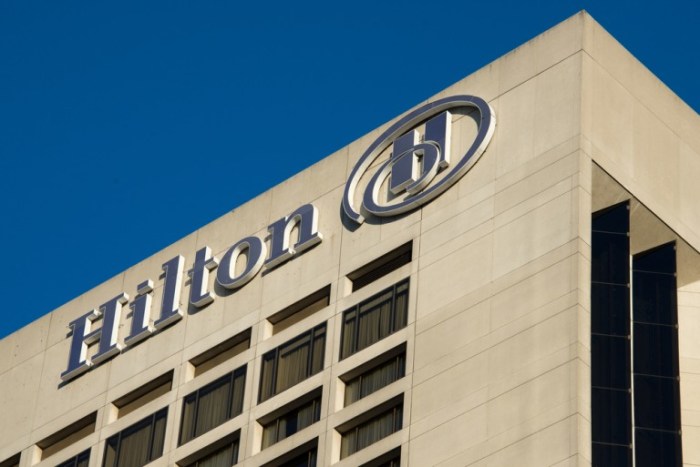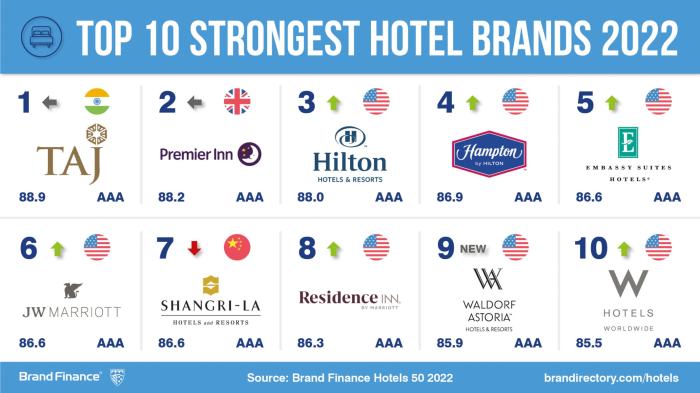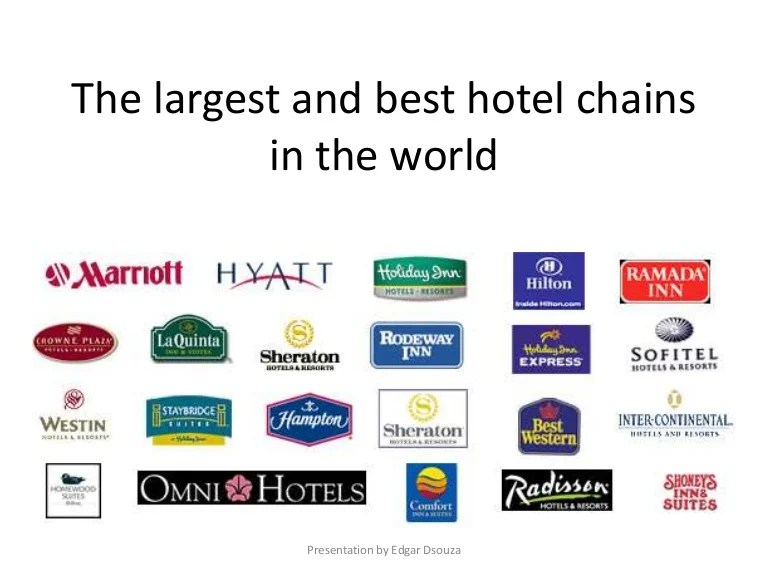National hotel chains, with their expansive reach and renowned brands, have significantly shaped the hospitality industry. This article delves into the fascinating world of these chains, exploring their evolution, market dynamics, branding strategies, and innovative practices.
As the industry continues to evolve, national hotel chains face both opportunities and challenges. Understanding their strategies and adapting to emerging trends will be crucial for their continued success in the competitive hospitality landscape.
Overview of National Hotel Chains
National hotel chains have become a dominant force in the hospitality industry, offering standardized accommodations and amenities to travelers across the country. Their origins can be traced back to the late 19th century, when hotel companies began to expand beyond their local markets to cater to the growing demand for travel.The
growth of national hotel chains has been driven by several factors, including the development of transportation networks, the rise of tourism, and the increasing popularity of business travel. Today, national hotel chains operate thousands of properties in major cities and tourist destinations, providing a wide range of options for travelers with varying needs and budgets.
Benefits of Operating a National Hotel Chain
- Increased brand recognition and customer loyalty
- Economies of scale in purchasing, marketing, and operations
- Access to a wider customer base
- Enhanced ability to negotiate favorable terms with suppliers and vendors
Challenges of Operating a National Hotel Chain
- Intense competition from other national and international hotel chains
- Need to maintain consistent quality standards across multiple properties
- Managing complex supply chains and logistics
- Fluctuations in demand and seasonality
Market Share and Competition

Within the hospitality industry, national hotel chains hold a significant market share, dominating the sector with their extensive presence and brand recognition. Understanding the market dynamics and competitive strategies employed by these chains is crucial for assessing the industry landscape.
For those who cherish the companionship of their furry friends, Kimpton Hotels & Restaurants stands out as one of the most pet-friendly hotel chains. With a warm welcome and amenities tailored to your pet’s needs, you can enjoy a worry-free vacation with your beloved companion.
Major National Hotel Chains and Market Share
The top national hotel chains in terms of market share include:
- Marriott International: 30.3%
- Hilton Worldwide: 22.8%
- InterContinental Hotels Group (IHG): 14.5%
- Wyndham Hotels & Resorts: 10.2%
- Choice Hotels International: 9.7%
These chains operate a vast portfolio of properties, ranging from budget-friendly options to luxury accommodations, catering to diverse traveler needs.
Competitive Landscape and Strategies
The competitive landscape within the national hotel chain industry is highly dynamic, with chains constantly striving to gain market share and maintain customer loyalty. Key strategies employed include:
- Brand Differentiation:Chains focus on establishing unique brand identities, targeting specific customer segments through tailored offerings and marketing campaigns.
- Loyalty Programs:Comprehensive loyalty programs incentivize repeat bookings, offering rewards and exclusive benefits to frequent guests.
- Technology Adoption:Chains leverage technology to enhance guest experiences, streamline operations, and personalize services.
- Expansion and Acquisition:Strategic acquisitions and expansion into new markets allow chains to increase their reach and market presence.
- Partnerships and Alliances:Collaborations with airlines, travel agencies, and other businesses provide cross-marketing opportunities and access to new customer segments.
Brand Recognition and Loyalty: National Hotel Chains
Brand recognition and loyalty are crucial for national hotel chains as they establish a distinctive identity and foster customer trust. These factors drive repeat business, positive word-of-mouth, and increased revenue.
Thrill-seekers will find endless excitement at Dream World Aqua , a sprawling water park with thrilling slides, wave pools, and exhilarating rides. Immerse yourself in a world of aquatic adventure and create memories that will last a lifetime.
Successful branding campaigns create a memorable brand image and differentiate the chain from competitors. For instance, Hilton’s “Hilton Honors” loyalty program rewards frequent guests with exclusive perks and upgrades, enhancing their loyalty and driving repeat bookings.
For budget-conscious travelers, the OYO Hotel Chain offers a wide range of affordable accommodations. With over 800,000 rooms across 80 countries, you’ll find comfortable and convenient stays without breaking the bank.
Customer Relationship Management
Effective customer relationship management (CRM) programs nurture customer relationships and personalize their experiences. These programs collect customer data, track preferences, and offer tailored promotions and services, leading to increased customer satisfaction and loyalty.
Online Reputation Management
Online reputation management is essential for building and maintaining brand recognition and loyalty. Positive reviews and a strong social media presence influence customer perception and attract new guests. Chains actively monitor online reviews, respond promptly to feedback, and address negative experiences, ensuring customer satisfaction and building a positive brand image.
Escape to paradise at Bull Dorado Beach & Spa , where tranquility meets luxury. Indulge in a relaxing retreat amidst pristine beaches and rejuvenating spa treatments. Whether you seek adventure or relaxation, this idyllic destination offers an unforgettable experience.
Customer Segmentation and Targeting
National hotel chains implement strategic segmentation and targeting approaches to cater to the diverse needs and preferences of their clientele. They meticulously identify and profile distinct customer segments based on demographics, travel patterns, and preferences.
To effectively reach and engage these segments, national hotel chains employ a multifaceted array of marketing strategies. These strategies encompass targeted advertising campaigns, loyalty programs, personalized communication, and collaborations with travel agents and online booking platforms.
Segmentation by Demographics
National hotel chains segment their customer base based on demographic characteristics such as age, income, and family size. This segmentation enables them to tailor their offerings and marketing messages to specific age groups, income levels, and family needs.
- Millennials: National hotel chains target millennials with tech-savvy offerings, such as mobile check-in and digital room keys.
- Business travelers: This segment is catered to with amenities like business centers, complimentary Wi-Fi, and airport shuttle services.
- Families: Hotel chains offer family-friendly amenities such as connecting rooms, kids’ clubs, and babysitting services.
Segmentation by Travel Patterns
National hotel chains also segment their customers based on their travel patterns, including frequency of travel, purpose of travel, and preferred destinations. This segmentation allows them to develop targeted marketing campaigns that resonate with each segment’s specific travel needs.
- Frequent travelers: Hotel chains offer loyalty programs and exclusive benefits to encourage repeat bookings from frequent travelers.
- Leisure travelers: Marketing campaigns are tailored to highlight the hotel’s amenities and experiences that appeal to leisure travelers.
- Business travelers: Hotel chains focus on promoting their convenient locations, business amenities, and flexible booking options.
Segmentation by Preferences
National hotel chains further segment their customers based on their preferences, such as desired room type, amenities, and hotel brands. This segmentation enables them to provide personalized recommendations and tailor their offerings to meet the unique preferences of each customer.
- Luxury travelers: Hotel chains offer high-end amenities, exclusive experiences, and personalized services to cater to luxury travelers.
- Budget travelers: Hotel chains offer affordable options and value-added packages to appeal to budget-conscious travelers.
- Eco-conscious travelers: Hotel chains highlight their sustainability practices and eco-friendly initiatives to attract eco-conscious travelers.
Pricing and Revenue Management

Pricing strategies and revenue management play a crucial role in optimizing hotel occupancy and maximizing revenue for national hotel chains. These strategies aim to strike a balance between attracting guests, generating revenue, and maintaining profitability.
National hotel chains employ various pricing strategies, including:
- Competitive Pricing:Setting prices in line with or slightly below competitors to attract guests and gain market share.
- Value-Based Pricing:Charging prices based on the perceived value of the hotel’s amenities, services, and location.
- Dynamic Pricing:Adjusting prices in real-time based on demand, occupancy, and other factors to maximize revenue.
- Tiered Pricing:Offering different price levels for different room types, amenities, and loyalty programs.
Revenue Management
Revenue management is a sophisticated discipline that involves analyzing demand patterns, forecasting occupancy, and adjusting prices and inventory to optimize hotel revenue. Key components of revenue management include:
- Demand Forecasting:Predicting future demand based on historical data, market trends, and external factors.
- Inventory Management:Allocating hotel rooms to different channels and rate plans to maximize occupancy and revenue.
- Pricing Optimization:Determining the optimal price for each room type and time period based on demand and competition.
- Overbooking and Yield Management:Managing overbookings and cancellations to maximize revenue while minimizing guest dissatisfaction.
Effective revenue management enables national hotel chains to increase occupancy, optimize pricing, and maximize revenue by matching supply with demand and responding to market dynamics.
Distribution and Channel Management

National hotel chains utilize various distribution channels to reach potential customers and increase bookings. These channels include:
- Online Travel Agents (OTAs):OTAs such as Expedia, Booking.com, and Travelocity offer a wide selection of hotels and allow customers to compare prices and amenities.
- Global Distribution Systems (GDS):GDSs such as Amadeus and Sabre connect hotels to travel agents worldwide, enabling them to book rooms for their clients.
- Hotel Websites:Hotel chains have their own websites where customers can book directly, often offering exclusive deals and loyalty rewards.
- Phone Reservations:Customers can call the hotel directly to make reservations.
Effective channel management is crucial for national hotel chains. By optimizing their presence on different channels, they can increase visibility, attract more bookings, and manage inventory effectively. Channel management also allows hotels to track performance, analyze demand patterns, and adjust pricing and promotions accordingly.
Importance of Channel Management
Channel management plays a significant role in hotel bookings by:
- Increasing Reach:By distributing inventory across multiple channels, hotels can reach a wider audience and attract more potential guests.
- Optimizing Pricing:Channel management tools allow hotels to track pricing across different channels and adjust their rates to maximize revenue.
- Managing Inventory:Effective channel management helps hotels avoid overbooking by synchronizing inventory availability across all channels.
- Enhancing Customer Experience:By providing customers with multiple booking options, hotels can improve the overall booking experience and increase customer satisfaction.
Technology and Innovation
Technology has revolutionized the operations of national hotel chains, enhancing guest experiences and streamlining operations.
As you plan your next getaway, consider the Best Western chain , renowned for its exceptional hospitality. With over 4,000 locations worldwide, you’re sure to find a comfortable and convenient stay wherever your travels take you.
From mobile check-in and keyless entry to personalized recommendations and automated guest services, technology is transforming the hospitality industry.
Property Management Systems
- Centralized platforms that manage reservations, guest profiles, and hotel operations
- Enable efficient room assignment, housekeeping coordination, and revenue management
- Provide real-time data and insights to optimize operations and enhance guest satisfaction
Guest-Facing Technology
- Mobile apps for check-in, room controls, and concierge services
- Smart TVs with streaming capabilities and personalized content
- Voice-activated assistants for room service, amenities requests, and local information
Data Analytics
- Collecting and analyzing guest data to understand preferences, identify trends, and personalize experiences
- Predictive analytics to forecast demand, optimize pricing, and target marketing campaigns
- Customer relationship management (CRM) systems to nurture guest relationships and build loyalty
Sustainability and Efficiency
- Smart lighting and energy management systems to reduce environmental impact and operating costs
- Automated check-in and checkout processes to streamline operations and minimize guest wait times
- Digital room keys to eliminate the need for physical keys and enhance security
Sustainability and Environmental Practices

National hotel chains have recognized the growing importance of sustainability and environmental practices. They are implementing various initiatives to reduce their environmental impact and promote corporate social responsibility.The adoption of sustainable practices has become essential for several reasons. Firstly, it aligns with the increasing demand from consumers for businesses to operate responsibly.
Secondly, it helps to reduce operating costs by optimizing energy and water usage. Thirdly, it enhances brand reputation and loyalty among environmentally conscious customers.
Environmental Initiatives
National hotel chains are implementing various environmental initiatives, including:
- Reducing energy consumption through energy-efficient appliances, lighting, and building design.
- Conserving water by installing low-flow fixtures, rainwater harvesting systems, and water-saving landscaping.
- Minimizing waste through recycling programs, composting, and reducing single-use plastics.
- Sourcing sustainable materials for construction, furnishings, and amenities.
- Partnering with local organizations to support environmental conservation efforts.
Case Studies
Case studies offer valuable insights into the strategies and best practices employed by successful national hotel chains. By analyzing these case studies, we can identify the key factors that contribute to their success and learn from their innovative approaches.
Hilton Worldwide
Hilton Worldwide is a leading global hospitality company with a portfolio of 18 brands and over 6,800 properties in 122 countries. Hilton has a strong focus on customer loyalty, with its Hilton Honors program boasting over 120 million members. The company has also been recognized for its commitment to sustainability and environmental practices.
One of Hilton’s key strategies is its emphasis on brand differentiation. Each of its brands has a distinct target market and value proposition, allowing Hilton to cater to a wide range of travelers. Hilton has also invested heavily in technology, developing mobile apps and digital platforms to enhance the guest experience.
Marriott International
Marriott International is another global hospitality giant with over 30 brands and 8,100 properties in 139 countries. Marriott has a strong presence in the luxury and upper-upscale segments, with brands such as Ritz-Carlton, St. Regis, and JW Marriott.
Marriott’s success can be attributed to its focus on innovation and customer experience. The company has developed innovative concepts such as the Moxy Hotels brand, which targets millennials with its affordable and stylish accommodations. Marriott has also invested in mobile technology, allowing guests to check in, request services, and even unlock their room doors using their smartphones.
InterContinental Hotels Group (IHG), National hotel chains
IHG is a global hotel company with over 17 brands and 6,000 properties in 100 countries. IHG is known for its strong presence in the mid-scale and upscale segments, with brands such as Holiday Inn, Crowne Plaza, and Hotel Indigo.
IHG’s strategy is focused on growth and expansion. The company has been actively acquiring new properties and developing new brands. IHG has also invested in technology and digital marketing to reach a wider audience and enhance the guest experience.
Future Trends and Outlook
The future of the national hotel chain industry is expected to be shaped by a convergence of technological advancements, changing consumer preferences, and sustainability concerns. Emerging trends such as the rise of smart hotels, personalized guest experiences, and eco-friendly practices are poised to reshape the competitive landscape and drive growth opportunities.
Technological Advancements
- Smart Hotels:Integration of IoT devices, artificial intelligence (AI), and voice assistants to enhance guest convenience and automate operations.
- Personalized Guest Experiences:Use of data analytics to tailor experiences based on individual preferences, such as room temperature, lighting, and entertainment.
- Mobile Check-in and Digital Keys:Streamlined guest check-in processes and contactless room access through mobile devices.
Changing Consumer Preferences
- Experiential Travel:Growing demand for unique and memorable travel experiences, including adventure activities and cultural immersion.
- Wellness and Sustainability:Increasing focus on health and well-being, with amenities such as fitness centers, spas, and eco-friendly practices.
- Bleisure Travel:Blending business and leisure travel, with hotels offering flexible workspaces and meeting facilities.
Sustainability Concerns
- Eco-friendly Practices:Implementing sustainable initiatives such as energy efficiency, water conservation, and waste reduction.
- Green Certifications:Achieving third-party certifications to demonstrate environmental commitment and attract eco-conscious guests.
- Community Involvement:Partnering with local businesses and supporting community initiatives to enhance social responsibility.
Concluding Remarks
The future of national hotel chains is poised for further innovation and growth. By embracing technology, sustainability, and customer-centric approaches, these chains will continue to redefine the guest experience and drive the industry forward.
As travelers seek personalized and memorable experiences, national hotel chains will need to remain agile and adaptable to meet their evolving needs. The industry is ripe with potential, and the future holds exciting possibilities for these hospitality giants.


